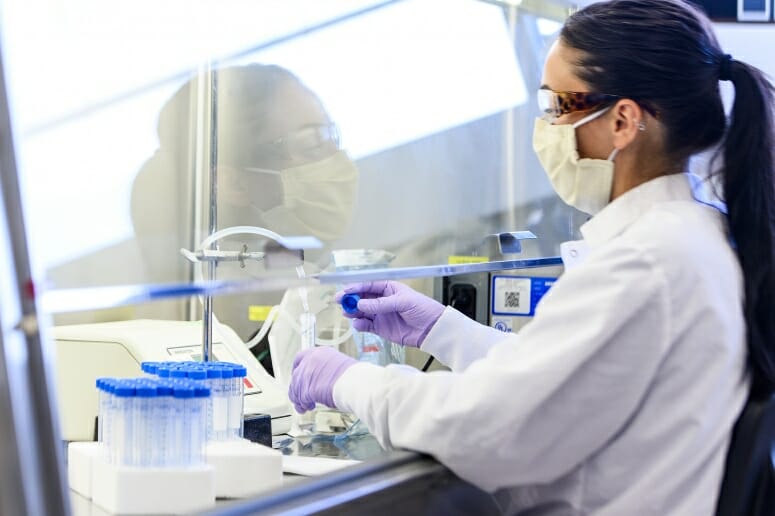17 Jul UW–Madison establishes free, campus-wide COVID-19 testing to support campus reopening

UW student Megan Skoyen dispenses viral transport media for COVID-19 test kits that are being created at the Wisconsin Veterinary Diagnostic Lab. PHOTO: BRYCE RICHTER
In the early days of the pandemic, when labs across the country were struggling to meet the demand for testing supplies and materials, the Wisconsin Veterinary Diagnostic Laboratory immediately took action. The state’s leading animal health lab provided COVID-19 test kits, scarce materials, equipment and training to the Wisconsin State Laboratory of Hygiene, which performs COVID-19 testing for high-priority patients statewide.
Now, the two labs are coming together again in support of University of Wisconsin–Madison efforts to provide free COVID-19 testing to the entire campus community. The goal is to identify infections, isolate and care for those who are sick, and limit the spread of the disease as campus moves forward with a modified re-opening plan.
By the beginning of the fall semester on September 2, UW–Madison will offer no-cost testing to all students, faculty and staff, with some testing set to begin in early August.
The full campus plan also includes regular screening of UW Housing residents and employees and surveillance testing among volunteer groups of students and employees from representative areas of campus. This approach will allow campus to rapidly identify and isolate potential cases, including among people who may not exhibit symptoms of COVID-19, helping to curb disease transmission.
The plans for campus testing include three components: establishing multiple sites across campus for any employee or student who desires a COVID-19 test; a mandatory screening program to identify and contain potential infections in residence halls; and volunteer cohorts of individuals across representative campus populations that will provide regular samples to assist campus and public health officials monitor for the prevalence of disease. The WVDL expects it can run more than 6,000 tests per week.



